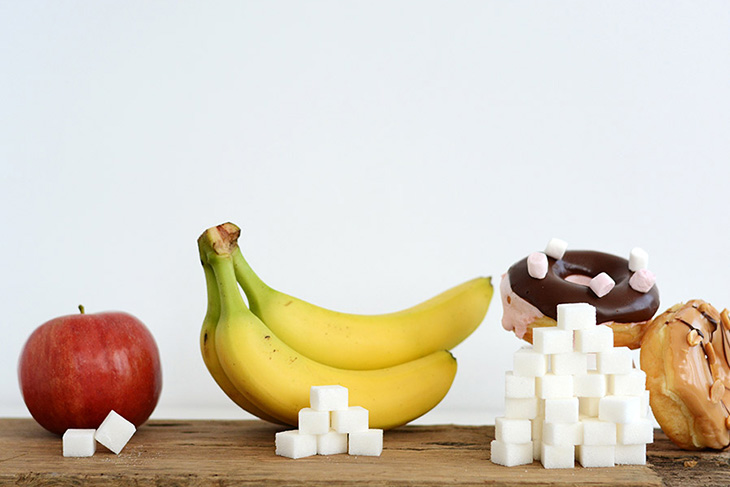Facts about sugar and weight loss

For many, sugary foods have been staples since childhood. Added sugar sweetens your tea/coffee, dusts your pancakes and is central to many treat foods.
But what role do sugars play in our health and weight? And how much is OK to eat?
What are sugars?
Sugars are a type of carbohydrate found in the foods we consume (the other types of carbohydrates are starches and maltodextrins). Some sugars occur naturally in our food and some are added during processing. Foods that contain naturally occurring sugars include nutritious foods like fruit, milk, yoghurt and vegetables. Foods high in added sugars include processed foods like lollies, soft drinks and baked goods like cakes. Unfortunately, most food labels don’t tell you whether the sugar is naturally occurring or added, or help you distinguish between the slowly absorbed and the rapidly absorbed sugars either.
The main types of sugar are:
- Monosaccharides
- Fructose — found naturally in fruit and honey
- Glucose — found naturally in fruits, veggies, nectar and sap of plants, and is also added to foods as a sweetener
- Galactose — found in milk
- Disaccharides
- Sucrose (fructose + glucose) — regular table sugar you put in your tea/coffee
- Maltose (glucose + glucose) — found naturally in beer and bread
- Lactose (galactose + glucose) — found naturally in dairy foods like milk and yoghurt
*Rice syrup is a mixture of the sugars glucose and maltose.
How is sugar processed by the body?
Regardless of the source, sugars are like any other macronutrient in that they get broken down in your digestive tract and are absorbed into your bloodstream. They are then converted into their simplest form, glucose, which is used as energy (the main fuel for your brain, nervous system and muscles) or stored as glycogen in your liver and muscles, and when that storage capacity is maxed out excess sugar is stored as fat.
There is a misconception that all sugars have a high GI. In fact, a lot of foods containing naturally occurring sugar have a low GI. For example, since fresh fruit contains fibre and dairy foods contains protein, the natural sugars are absorbed more slowly into your bloodstream, creating a slower release of sugar into your bloodstream and longer lasting energy. Refined added sugars like sucrose have a medium GI. Glucose, maltose and rice syrup all have a high GI.
As for the adverse health effects of added sugars, there’s no doubt that in the long term they can contribute to dental caries — i.e. tooth decay — if you don’t brush your teeth regularly.
Traditionally, sugar has been blamed for causing type 2 diabetes but the relationship is complex. The causes of type 2 diabetes are not due to one food, ingredient or nutrient alone but likely to be a combination of family history, age, ethnicity, lack of exercise, obesity, and many other factors including a high consumption of high GI foods over the course of a lifetime. Added refined sugars can contribute excess kilojoules, which can contribute to weight gain, which can increase the risk of developing type 2 diabetes.
How much sugar can you eat?
The Australian Dietary Guidelines don't specify exactly how much — or how little — total or added sugars you should eat. However, they do recommend that people “limit their intake of foods and drinks containing added sugars such as confectionary, sugar-sweetened soft drinks and cordials, fruit drinks, vitamin waters, energy and sports drinks”.
The World Health Organisation (WHO) recommends limiting your daily added sugars intake to no more than 10% of total energy (kilojoule) —which is about 55 grams, or 12 teaspoons each day for the average Australian adult.
The Total Wellbeing Diet takes a more practical approach to sugar consumption and we prefer to recommend food groups to single nutrients. After all, you eat food and not nutrients.
The Total Wellbeing Diet includes 1 Indulgence unit each day. Typically, that can be a scoop of ice cream, a few squares of chocolate or a small glass of wine. If you stick to this target, you will keep your added sugars intake to within the health guidelines.
Does sugar make you gain weight?
Too much of any food can leads to weight gain — whether that's chocolate bunnies or chia seeds. The difference lies in how easy it is to overeat one food compared to another. For most people, it's easier to over-consume processed foods high in added sugars compared to whole foods high in fibre or protein. That’s why the Australian Dietary Guidelines recommend limiting your intake of discretionary foods and drinks containing added sugars, such as confectionary, sugar-sweetened soft drinks and cordials, fruit drinks, vitamin waters, energy and sports drinks — because they are easy to over-consume and may contribute to weight gain.
Of course, we should also limit our consumption of other discretionary foods low in sugars but high in refined carbohydrates and/or total fats like potato crisps, salty snacks and deep fried foods. And let’s not forget about alcoholic drinks which are also discretionary — limit your intake to 1 standard drink a day.
According to our CSIRO Healthy Diet Score quiz, which has so far been completed over 300,000 times, the Australian intake of discretionary foods and drinks is three times higher than the recommended daily limit. Blaming the obesity epidemic on sugars alone is therefore too simplistic. It’s a complicated issue that cannot be reduced to a single cause. If it was that easy, it would be relatively easy to fix.
The bottom line
The bottom line is, consuming high levels of added sugars can lead to weight gain which can impact your health in negative ways. But sugar alone isn't the culprit. It's important to take a look at your overall intake and consider the total amount of kilojoules, amount and type of carbohydrate, total fat, saturated fat, sodium (salt) and fibre. The good news is, the Total Wellbeing Diet is a whole foods based eating plan that makes healthy eating satisfying and easy.
